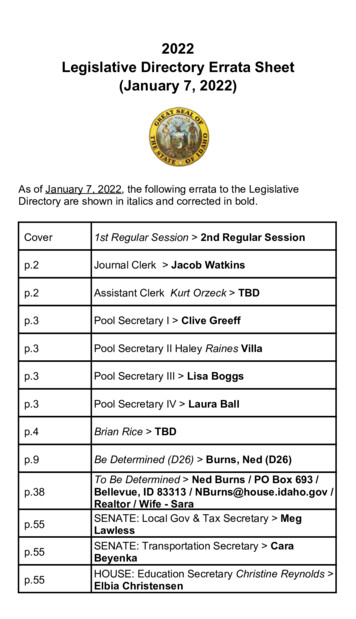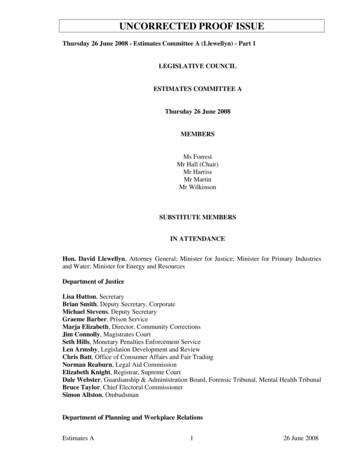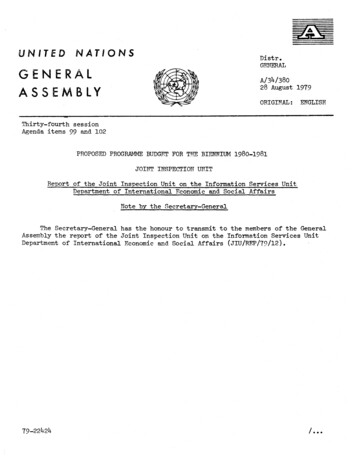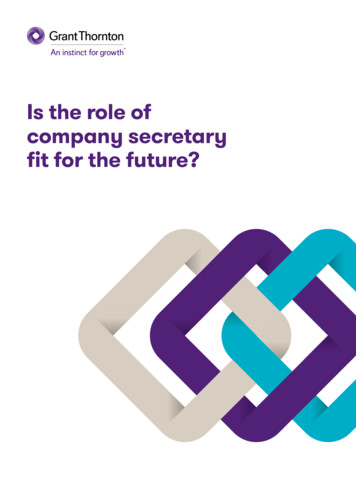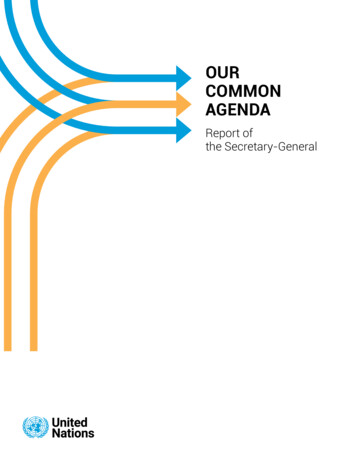
Transcription
OURCOMMONAGENDAReport ofthe Secretary-General
COPYRIGHT:Our Common Agenda – Report of the Secretary-GeneralPublished by the United NationsNew York, NY 10017, United States of AmericaCopyright 2021 United NationsAll rights reservedThis publication in its entirety may not be reproduced or transmitted in any form or by any means,electronic or mechanical, including photocopying, recording or any information storage and retrievalsystem now known or to be invented, without written permission from the publisher.All queries on rights and licences, including subsidiary rights, should be addressed to:United Nations Publications405 East 42nd Street, S-09FW001New York, NY 10017United States of AmericaE-mail: permissions@un.org; website: http://shop.un.orgRequests to reproduce excerpts or to photocopy this publication should be addressedto the Copyright Clearance Center at www.copyright.com.ISBN: 978-92-1101446-4eISBN: 978-92-1001012-2epubISBN: 978-92-1358389-0Sales No. E.21.I.8Designed and produced by:Division of Conference Management, United Nations Office at GenevaDepartment of Global Communications, United Nations, New YorkDepartment for General Assembly and Conference Management, United Nations, New YorkCredits:All photographs used in this publication have been sourced from the United Nations Secretariat and other UnitedNations entities. Unless otherwise indicated, all data in this publication were sourced from the United Nations.Cover: UN-Women/Paola Garcia
SummaryWe are at an inflection point in history.In our biggest shared test since the Second World War, humanity faces a stark and urgent choice: a breakdownor a breakthrough.The coronavirus disease (COVID-19) is upending our world, threatening our health, destroying economiesand livelihoods and deepening poverty and inequalities.Conflicts continue to rage and worsen.The disastrous effects of a changing climate – famine, floods, fires and extreme heat – threaten our veryexistence.For millions of people around the world, poverty, discrimination, violence and exclusion are denying themtheir rights to the basic necessities of life: health, safety, a vaccination against disease, clean water to drink,a plate of food or a seat in a classroom.Increasingly, people are turning their backs on the values of trust and solidarity in one another – the veryvalues we need to rebuild our world and secure a better, more sustainable future for our people and our planet.Humanity’s welfare – and indeed, humanity’s very future – depend on solidarity and working together asa global family to achieve common goals.For people, for the planet, for prosperity and for peace.Last year, on the occasion of the seventy-fifth anniversary of the United Nations, Member States agreedthat our challenges are interconnected, across borders and all other divides. These challenges can onlybe addressed by an equally interconnected response, through reinvigorated multilateralism and the UnitedNations at the centre of our efforts.Member States asked me to report back with recommendations to advance our common agenda. Thisreport is my response.In preparing the report, we have engaged with a broad array of stakeholders, including Member States,thought leaders, young people, civil society and the United Nations system and its many partners.One message rang through loud and clear: the choices we make, or fail to make, today could result in furtherbreakdown, or a breakthrough to a greener, better, safer future.The choice is ours to make; but we will not have this chance again.That is why Our Common Agenda is, above all, an agenda of action designed to accelerate the implementationof existing agreements, including the Sustainable Development Goals.First, now is the time to re-embrace global solidarity and find new ways to work together for the commongood. This must include a global vaccination plan to deliver vaccines against COVID-19 into the arms ofthe millions of people who are still denied this basic lifesaving measure. Moreover, it must include urgentand bold steps to address the triple crisis of climate disruption, biodiversity loss and pollution destroyingour planet.OUR COMMON AGENDA – REPORT OF THE SECRETARY-GENERAL 3
SUMMARYSecond, now is the time to renew the social contract between Governments and their people and withinsocieties, so as to rebuild trust and embrace a comprehensive vision of human rights. People need to seeresults reflected in their daily lives. This must include the active and equal participation of women andgirls, without whom no meaningful social contract is possible. It should also include updated governancearrangements to deliver better public goods and usher in a new era of universal social protection, healthcoverage, education, skills, decent work and housing, as well as universal access to the Internet by 2030 as abasic human right. I invite all countries to conduct inclusive and meaningful national listening consultationsso all citizens have a say in envisioning their countries’ futures.Third, now is the time to end the “infodemic” plaguing our world by defending a common, empirically backedconsensus around facts, science and knowledge. The “war on science” must end. All policy and budgetdecisions should be backed by science and expertise, and I am calling for a global code of conduct thatpromotes integrity in public information.Fourth, now is the time to correct a glaring blind spot in how we measure economic prosperity and progress.When profits come at the expense of people and our planet, we are left with an incomplete picture of thetrue cost of economic growth. As currently measured, gross domestic product (GDP) fails to capture thehuman and environmental destruction of some business activities. I call for new measures to complementGDP, so that people can gain a full understanding of the impacts of business activities and how we can andmust do better to support people and our planet.Fifth, now is the time to think for the long term, to deliver more for young people and succeeding generationsand to be better prepared for the challenges ahead. Our Common Agenda includes recommendations formeaningful, diverse and effective youth engagement both within and outside the United Nations, includingthrough better political representation and by transforming education, skills training and lifelong learning.I am also making proposals, such as a repurposed Trusteeship Council, a Futures Lab, a Declaration onFuture Generations and a United Nations Special Envoy to ensure that policy and budget decisions takeinto account their impact on future generations. We also need to be better prepared to prevent and respondto major global risks. It will be important for the United Nations to issue a Strategic Foresight and GlobalRisk Report on a regular basis, and I also propose an Emergency Platform, to be convened in response tocomplex global crises.Sixth, now is the time for a stronger, more networked and inclusive multilateral system, anchored withinthe United Nations. Effective multilateralism depends on an effective United Nations, one able to adapt toglobal challenges while living up to the purposes and principles of its Charter. For example, I am proposinga new agenda for peace, multi-stakeholder dialogues on outer space and a Global Digital Compact, as wellas a Biennial Summit between the members of the Group of 20 and of the Economic and Social Council, theSecretary-General and the heads of the international financial institutions. Throughout, we need strongerinvolvement of all relevant stakeholders, and we will seek to have an Advisory Group on Local and RegionalGovernments.For 75 years, the United Nations has gathered the world around addressing global challenges: from conflictsand hunger, to ending disease, to outer space and the digital world, to human rights and disarmament. Inthis time of division, fracture and mistrust, this space is needed more than ever if we are to secure a better,greener, more peaceful future for all people. Based on this report, I will ask a High-level Advisory Board, led byformer Heads of State and Government, to identify global public goods and other areas of common interestwhere governance improvements are most needed, and to propose options for how this could be achieved.4OUR COMMON AGENDA – REPORT OF THE SECRETARY-GENERAL
SUMMARYIn this spirit, I propose a Summit of the Future to forge a new global consensus on what our future shouldlook like, and what we can do today to secure it.Humanity has shown time and time again that it is capable of great achievements when we work together.This common agenda is our road map to recapture this positive spirit and begin rebuilding our world andmending the trust in one another we need so desperately at this moment in history.Now is the time to take the next steps in our journey together, in solidarity with and for all people. UN Photo/Eskinder DebebeOUR COMMON AGENDA – REPORT OF THE SECRETARY-GENERAL 5
KEY PROPOSALS ACROSS THE 12 COMMITMENTSFrom the declaration on the commemorationof the seventy-fifth anniversary of the United NationsPROPOSED KEY MOMENTSAll proposed actions are in line with and designed to acceleratethe achievement of the Sustainable Development Goals.1. Leave noone behindsocial contract anchored in Renewedhuman rightsera for universal social protection, Newincluding health care and basicincome security, reaching the 4 billionunprotectedadequate housing, education Reinforceand lifelong learning and decent work Digital inclusivity World Social Summit in 2025 Identify complementary measures to GDP2. Protectour planetmeeting ahead of the global Leadersstocktaking in 2023to the 1.5-degree Celsius goal Commitand net zero emissions by 2050 or soonerDeclarations of climate emergencyand right to a healthy environmentPackage of support to developingcountries Measures for adaptation and resiliencenew coal after 2021 and phasing Noout fossil fuel subsidiesfor the environment Accountin economic models, carbonpricing mechanisms and crediblecommitments by financial actors Post-2020 biodiversity frameworkfood systems for Transformingsustainability, nutrition and fairnessby the General Assembly Actionon territorial threats of climatechange and to prevent, protect andresolve situations of environmentaldisplacement63. Promote peace andprevent conflicts New agenda for peace to:strategic risks (nuclear Reduceweapons, cyberwarfare,autonomous weapons) Strengthen international foresightresponses to all forms Reshapeof violencein prevention and Investpeacebuilding, includingPeacebuilding Fund andPeacebuilding Commission women and girls at the Putcentre of security policy5. Place womenand girls atthe centre Repeal of gender-discriminatory lawsgender parity, including Promotethrough quotas and special measureswomen’s economic Facilitateinclusion, including investment in thecare economy and support for womenentrepreneurs Include voices of younger womenof violence against Eradicationwomen and girls, including through anemergency response planSupport regional preventionsecure and sustainable use of Peaceful,outer space, including through a multistakeholder dialogue on outer space4. Abide byinternational lawand ensure justicerights as a problem-solving Humanmeasure, including by comprehensiveanti-discrimination laws andpromoting participationof human rights online Applicationand to frontier issues and newtechnologiesaccess to the Internet as a Universalhuman rightrights mechanisms on a more Humansustainable financial footingidentity for all, end to Legalstatelessness and protection ofinternally displaced persons, refugeesand migrants New vision for the rule of lawroad map for the development Globaland effective implementation ofinternational lawOUR COMMON AGENDA – REPORT OF THE SECRETARY-GENERAL6. Build trustcode of conduct that promotes Globalintegrity in public informationpeople’s experiences with Improvepublic institutions and basic servicesnational listening and Inclusive“envisioning the future” exercisesto tackle corruption in line Actionwith the United Nations Conventionagainst Corruption Reformed international tax systemstructure on financial integrity Jointand tackling illicit financial flows
NEW AGENDAFOR PEACECLIMATEACTIONGLOBAL DIGITALCOMPACTOUTER SPACEDIALOGUESUSTAINABLEDEVELOPMENTEMERGENCY RESPONSEPLATFORM FOR COMPLEX CRISESDECLARATIONON FUTUREGENERATIONSHIGH-LEVELADVISORY BOARDHIGH-LEVEL TRACKSTRANSFORMING EDUCATION SUMMIT7. Improve digitalcooperationSUMMIT OF THE FUTURE9. Ensure sustainablefinancingSummit between the Group of Global Digital Compact to: Biennial20, the Economic and Social Council,all people to the Internet, Connectthe Secretary-General and the heads ofincluding all schoolsinternational financial institutions for Avoid Internet fragmentationa sustainable, inclusive and resilientglobal economy including to: Protect dataApplyhumanrightsonlinea Sustainable Development SupportGoalinvestmentboost, includingIntroduceaccountabilitycriteria for discrimination and misleadingthrough a last-mile alliance to reachcontent commons as a global Digitalpublic goodPromote regulation of artificialintelligence8. Upgrade theUnited NationsAdvisory Board led High-levelby former Heads of State andGovernment on improved governanceof global public goodspolicy that puts people System-wideat the centre, taking into account age,gender and diversitylistening, participation and Moreconsultation (including digitally),building on the seventy-fifthanniversary declaration and OurCommon Agendaparity within the United GenderNations system by 2028the Secretary-General’s Re-establishScientific Advisory Board11. Listen to andwork with youthYouthbarriers to political participation Removeand measure progress through a “youthin politics” index United Nations Youth Office Transforming Education Summit in 2022barometer to track career paths Recoveryand labour market outcomes for youthcoalition to promote green High-ambitionand digital-economy job creationmore flexible research and Providedevelopment incentivesFuture generationsweaknesses in the debtSummit of the Future in 2023 Resolve architectureEnsure long-term thinking, including Fairer and more resilient multilateral through a United Nations Futures Labthose furthest behindtrading system, including areinvigorated WTO New business modelsthe United Nations budget Improveprocess10. Boostpartnershipsmeetings between the United AnnualNations and all heads of regionalorganizationsengagement between the StrongerUnited Nations system, internationalfinancial institutions and regionaldevelopment bankssystematic engagement with Moreparliaments, subnational authoritiesand the private sectorof change” for United Nationssociety focal points in all United “Quintet Civil2.0, including innovation, data,Nations entitiesstrategic foresight, results orientationand behavioural scienceWORLD SOCIAL SUMMITNations Office for Partnerships Unitedto consolidate access and inclusion,including accessibility onlinesucceeding generations, Representincluding through a repurposedTrusteeship Council, a Declaration onFuture Generations, and a United NationsSpecial Envoy for Future Generations12. Be preparedPlatform to be convened in Emergencyresponse to complex global crisesForesight and Global Risk Report Strategicby the United Nations every five years On global public health: Global vaccination plan Empowered WHOglobal health security and Strongerpreparednessproduct development Accelerateand access to health technologies inlow- and middle-income countrieshealth coverage and Universaladdressing determinants of healthOUR COMMON AGENDA – REPORT OF THE SECRETARY-GENERAL 7
ContentsI. A wake-up call. 12A. The choice before us. 14B. Renewing solidarity. 14C. Our Common Agenda. 18II. We the peoples: a renewed social contract anchored in human rights. 22A. Foundations of a renewed social contract. 22B. Trust. 24C. Inclusion, protection and participation. 27D. Measuring and valuing what matters to people and the planet. 33III. Succeeding generations: shaping the future. 38A. Solidarity with younger generations. 39B. Solidarity with future generations. 43IV. Nations large and small: a new global deal to deliver global public goodsand address major risks. 48A. Protecting the global commons and delivering global public goods. 48B. Addressing major risks. 64C. Next steps. 65V. Purposes and principles: adapting the United Nations to a new era. 72A. For the Secretariat and the United Nations system. 72B. For Member States’ consideration. 76VI. Moving forward. 82Annex: Process for consultations onOur Common Agenda. 84OUR COMMON AGENDA – REPORT OF THE SECRETARY-GENERAL 9
I UN Photo/Fahad KaizerA wake-up call
CHAPTER IA wake-up callI. A wake-up call1. Seventy-five years ago, the world emerged froma series of cataclysmic events: two successiveworld wars, genocide, a devastating influenzapandemic and a worldwide economic depression.Our founders gathered in San Francisco promisingto save succeeding generations from the scourge ofwar; to reaffirm faith in fundamental human rights,in the dignity and worth of the human person, in theequal rights of men and women and of nations largeand small; to establish conditions under whichjustice and respect for international law can bemaintained; and to promote social progress andbetter standards of life in larger freedom. Theybelieved in the value of collective efforts to achievea better world and founded the United Nations tothat end.2. The Charter of the United Nations is an exceptionalachievement. Since 1945, international norms andinstitutions have delivered independence, peace,prosperity, justice, human rights, hope and supportfor billions of people. For many others, however,these aspirations were never fully realized andare now receding. Too many people are also beingexcluded from the opportunities and benefits oftechnology and transitioning economies, facing ableak future if we do not act fast.3. The coronavirus disease (COVID-19) pandemichas been a challenge like no other since the SecondWorld War, revealing our shared vulnerabilityand interconnectedness. It has exposed humanrights concerns and exacerbated deep fragilitiesand inequalities in our societies. It has amplifieddisenchantment with institutions and politicalleadership as the virus has lingered. We havealso seen many examples of vaccine nationalism.Moreover, with less than a decade to go, theSustainable Development Goals have been throwneven further off track.4. At the same time, the pandemic has led to a surgeof collective action, with people working together torespond to a truly global threat. The world needs to12THE COSTS OF COVID-19y Global GDP decreased by an estimated 3.5per cent in 2020.y The pandemic has pushed a further124 million people into extreme poverty.The pandemic-induced poverty surgewill also widen the gender poverty gap,meaning more women will be pushed intoextreme poverty than men.y Nearly one in three people in the world(2.37 billion) did not have access toadequate food in 2020 – an increase ofalmost 320 million people in just one year.y Early estimates suggest a potentialincrease of up to 45 per cent in childmortality because of health-serviceshortfalls and reductions in access tofood.y Total working hours fell by 8.8 per cent in2020, the equivalent of 255 million fulltime jobs.y Restricted movement, social isolationand economic insecurity are increasingwomen’s vulnerability to violence in thehome around the world.unite to produce and distribute sufficient vaccinesfor everyone. We have been reminded of the vitalrole of the State in solving problems, but also theneed for networks of actors stretching well beyondStates to cities, corporations, scientists, healthprofessionals, researchers, civil society, the media,faith-based groups and individuals. When we allface the same threat, cooperation and solidarityare the only solutions, within societies and betweennations.OUR COMMON AGENDA – REPORT OF THE SECRETARY-GENERAL
A wake-up callCHAPTER ISELECTED ACHIEVEMENTS OF THE MULTILATERAL SYSTEMPEACEHEALTHDespite ongoing international tensions, conflictand violence, the multilateral system with theUnited Nations at its centre has helped to avert athird world war or a nuclear holocaust.After a 10-year global effort led by WHOinvolving over 500 million vaccinations,smallpox was officially eradicated in 1980.Conflicts between States, 1946–2020Today, 85% of the world’schildren are vaccinatedand protected fromdebilitating diseases.85%64Source: WHO, 2020.2POVERTY ERADICATION01960198020002020East Asia and PacificRest of the WorldSource: Peace Research Institute Oslo, 2020.Total population (in billions)living in extreme povertyHUMAN RIGHTSThe Universal Declaration of Human Rights(1948) has helped to ensure that billions ofpeople live safer, longer and more dignified lives.2,080%1,51,080% of Member States have ratified at least four coreinternational human rights treaties, and all MemberStates have ratified at least one.0,501990Source: OHCHR, 2021.19952000200520102018Source: World Bank, 2018.ENVIRONMENTOzone depleting emissions sincethe Montreal Protocol, Index 1986 100%GENDER EQUALITY90% of United Nations Member States haveratified or acceded to the Convention on theElimination of All Forms of Discriminationagainst Women.150%120%90%-99%60%SINCE 198630%0South AsiaSub-Saharan AfricaProportion of seats held by women in nationalparliaments (percentage)25199019952000200520102015 2019Source: UNEP, 2021.201510HUMANITARIAN ACTION50In 2020, the United Nations and partnerorganizations p rovided humanitarian assistance tomore than 98 million people in 25 countries.1990199520002005201020152020Source: Statistics Division, 2021.Source: Office for the Coordination of Humanitarian Affairs, 2021.OUR COMMON AGENDA – REPORT OF THE SECRETARY-GENERAL 13
CHAPTER IA wake-up callA. The choice before us5. Let there be no illusion: COVID-19 may pale incomparison to future challenges if we do not learnfrom failures that have cost lives and livelihoods.Our best projections show that a stark choiceconfronts us: to continue with business as usualand risk significant breakdown and perpetual crisis,or to make concerted efforts to break through andachieve an international system that delivers forpeople and the planet. These omens must not beignored, nor these opportunities squandered.B. Renewing solidarity6. As the United Nations marked its seventy-fifthanniversary in 2020, people around the worldexpressed their belief in international cooperationwhile also conveying their concern at the mismatchbetween its promises and the realities in theirdaily lives. Member States echoed this in theirdeclaration on the commemoration of the seventyfifth anniversary of the United Nations (see GeneralAssembly resolution 75/1), resolving to keep thepromises that they have already made and asking forrecommendations to advance our common agendaand respond to current and future challenges.7. This report seeks to answer these calls, takingstock of challenges and recommending actionsthat build on what is working and improve whatis not. Multilateralism has evolved considerablysince the United Nations was founded, and wehave shown that we can come together to forgecollective solutions. However, this does not happenoften, effectively or inclusively enough.8. Everything proposed in this report depends on adeepening of solidarity. Solidarity is not charity; inan interconnected world, it is common sense. It isthe principle of working together, recognizing thatwe are bound to each other and that no communityor country can solve its challenges alone. It is aboutour shared responsibilities to and for each other,taking account of our common humanity and each14WHAT WE MEAN BY SOLIDARITYSolidarity is a fundamental value “byvirtue of which global challenges must bemanaged in a way that distributes costsand burdens fairly, in accordance with basicprinciples of equity and social justice, andensures that those who suffer or benefit theleast receive help from those who benefit themost” (General Assembly, resolution 57/213).person’s dignity, our diversity and our varying levelsof capacity and need. The importance of solidarityhas been thrown into sharp relief by COVID-19 andthe race against variants, even for countries thatare well advanced with vaccination campaigns.No one is safe until everyone is safe. The same istrue of our biodiversity, without which none of uscan survive, and for actions to address the climatecrisis. In the absence of solidarity, we have arrivedat a critical paradox: international cooperation ismore needed than ever but also harder to achieve.9. Through a deeper commitment to solidarity, atthe national level, between generations and in themultilateral system, we can avoid the breakdownscenario and, instead, break through towards amore positive future. This report proposes a pathforward, centred around a renewal of our socialcontract, adapted to the challenges of this century,taking into account young people and futuregenerations and complemented by a new globaldeal.10. A strong social contract anchored in humanrights at the national level is the necessaryfoundation for us to work together. It may notbe written down in any single document, but thesocial contract has profound consequences forpeople, underpinning their rights and obligationsand shaping their life chances. It is also vital forinternational cooperation, since bonds acrosscountries do not work when bonds within themare broken. The inequality, mistrust and intolerancethat we are seeing in many countries and regions,OUR COMMON AGENDA – REPORT OF THE SECRETARY-GENERAL
A wake-up callCHAPTER ITHE CHOICE BEFORE US:A SCENARIO OF BREAKDOWN AND PERPETUAL INGINEQUALITIESto unchanged emission levels Owingfrom human activity, global warming COVID-19 is endemic,constantly mutating Richer countries hoard vaccines, noplan for equitable distribution Health systems are overwhelmed No preparedness for futurepandemics A number of countries are poorer in2030 than before the pandemic hitof 2 C will be exceeded during thetwenty-first centuryfloods, droughts, tropical Heatwaves,cyclones and other extremes areunprecedented in magnitude, frequencyand timing and occur in regions thathave never been affected beforeArctic is ice free in the summer; Themost permafrost is lost and extremesea levels occur every yearmillion species are on the verge of Oneextinction, with irreversible biodiversity Continuous erosion of human rights Growing poverty, and massive lossof jobs and income Public goods like education andsocial protection systems areunderfunded Protests spread across borders,often met with violent repression Technology fuels division New types of warfare invented fasterthan new ways of making peacelossthan 1 billion people live with Moreheat that is so extreme that it threatenstheir livesWARNING SIGNS 9.2 trillion – estimatedcost to the global economyin 2021 alone if developingcountries do nothave equitable access toCOVID-19 vaccinesSource: International Chamberof Commerce, 2021.Up to 827,000 viruses thatcould infect humans existin mammals and birdsSource: International Institute forSustainable Development, 2021.CO2Increases in concentrationsof greenhouse gasessince around 1750 areunequivocally caused byhuman activities and haveled to 1.1 C of warmingbetween 1850 and 190036 low-income countries arein sovereign debt distress orat a high risk of falling intodebt distress (February 2021)Source: Department of Economicand Social Affairs, 2020.Source: IntergovernmentalPanel on Climate Change, 2021.The extinction rateis now 10–100 times higherthan at any other time in thepast 10 million yearsSource: United Nations, 2019.Rapid increase in non-State conflictssince 20103,0002,0001,000By 2050 there could be moreplastic th
OUR COMMON AGEND A - REPORT OF THE SECRETARY-GENERAL 7 7. Improve digital cooperation 10. Boost partnerships 9. Ensure sustainable financing 11. Listen to and work with youth 12.

